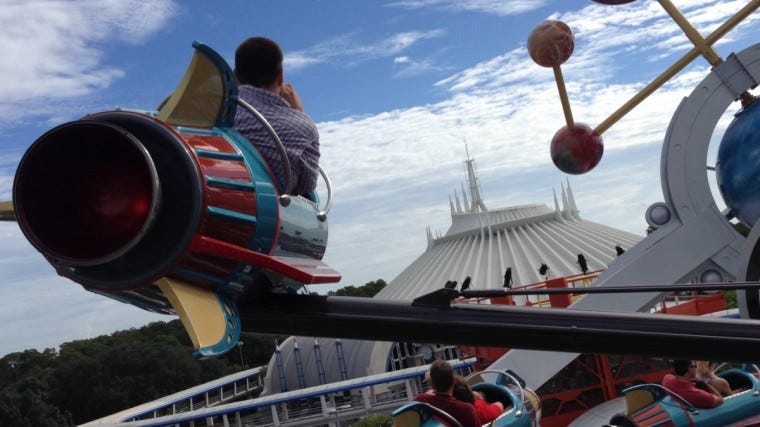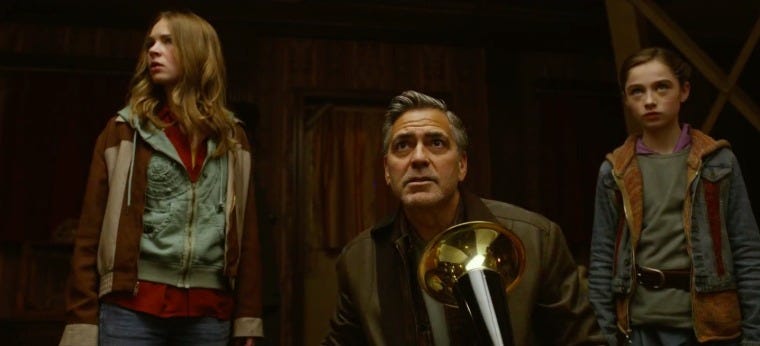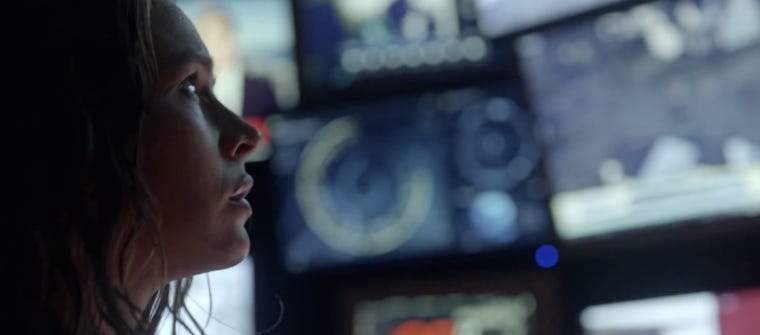Beastly Reviews: Tomorrowland
Disney had sixty years to get "Tomorrowland" right, but the movie feels like a made-for-TV misfire.
I’m Alexander Cheves, and this is LOVE, BEASTLY—a blog about sex, feelings, and manhood. It’s written mostly for men—gay, straight, bi, MSM, or just curious—but some readers are women, and some don’t fit into categories. Everyone’s welcome here.
This is Beastly Reviews, where I write about films that made me feel something.
These posts are free to read. Subscribe to unlock essays, advice, and more personal work.
Tomorrowland had the elements of a good Disney movie: nostalgia, proven actors, and timeliness. So how did Disney fuck it up? The film magnificently fails. It feels like a Disney Channel movie, cobbled together from weak plots and poor CGI.
Tomorrowland, a retro-futuristic section of Disney park, has been around for decades—in the Magic Kingdom, in Disneyland, and in Disneyland Paris—and was initially conceived by Walt Disney himself. So they had sixty years to get this movie right. What happened?
The film is so awkward, so subpar, that it's a bit insulting. Disney (the company, not the man) knew we adult-kids would see it, regardless of the bad reviews, because we grew up going to Tomorrowland. The movie follows Casey Newton (Britt Robertson), an aspiring rule-breaker who gets recruited by a creepy British robot girl named Athena to save the world. And that’s it.
Athena is from a place called Tomorrowland—another world with highly advanced technology—and she presents Casey with a vague, head-scratching plot of impending peril while they get chased by evil, nameless bad guys, who are also robots.
We learn that Tomorrowland, despite its name, isn't actually "the world of tomorrow”—or, you know, the future. Instead, it's another dimension, a separate reality from ours, with no connection whatsoever to the universe we all live in. It is, I repeat, completely unrelated to happenings on Earth.
Technically speaking, no one time-travels in this movie—they “dimension-hop,” or whatever. They're not jumping from the present to the future, but rather from one world to another. This fact left me badly confused.
Casey learns that her world (ours) faces imminent doom. Why? I still have no idea. And if these worlds are disconnected, and Tomorrowland has no bearing on our world and its doom, why does it matter? Why does it exist? What purpose does it serve? Why did Athena come from there to save our world? What relationship, if any, do these worlds have with each other?
These questions are never answered. The "end as we know it" (for our world, not Tomorrowland) will happen in less than two months, we’re never really told why, and there's nothing anyone can do about it—except, of course, a teenage white girl named Casey.
The end of the world is always so immediate in these movies. No one imagines us just petering out, a whimper rather than a bang. Tomorrowland becomes another hackneyed movie with an American teenager racing against the clock with new pals to save everyone. If the stakes are always this high and salvation this easy, eventually it’ll render all “world at stake” plots completely devoid of tension and downright dull.
We’re at that point. There’s never a moment when we even wonder if Casey might fail; we are assured by years of formulaic Disney garbage—silly superhero flicks in which the world is always almost destroyed by some baddie or another—that she will not.
Tomorrowland (the park, not the movie) is, crucially, an antiquated, retro-futurist vision of the future. Walking through it is an odd experience in seeing what people in the past thought the future would look like, not envisioning Facebook and global warming. It's George Jetson chic—a pitch of space travel and hope, not nihilism and despair.
So a film, set in our bleak current age, about a place—Tomorrowland—that embodies that hope, that retro-futurist, now vintage-looking postwar eagerness, that aspiration of humans living among the stars, could be timely and present and profoundly moving, even devastating. The tragedy, after all, is that such a world, one Walt Disney believed in, never came to pass. Why didn’t the filmmakers mine the source material, the tone and ideas of the theme park itself, a little better? Why did they slap up a weak made-for-TV kiddie ride and not something more serious? Ah, because it’s Disney.
Sorry, Jules Verne, but we don't live on Mars, and we probably won’t even survive on Earth much longer. Tomorrowland does not want to touch the hot potato of technology and the future, so it does neither—in fact, we never actually go to this magical other world of flying saucers and futuristic cities. Casey just uses its existence (and its robots) to save...ours? We are promised a vision of the future—sure, even if it must exist in another world—throughout the entire movie, that we never actually see. By the film’s end, I felt robbed even of wonder and excitement. At the very least, I wanted to be taken on a kiddie ride and shown lots of cool gadgets and flying cars. The film doesn’t even do that.
On a grander scale, the film promised to reinvigorate an old section of Disney park, perhaps because there's a current debate over whether they should tear it down and replace it with something new. Call in the wrecking crew.
Love, Beastly




